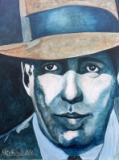The begining - Early Activists
After the Civil War blacks suffered greatly in the South. African Americans became targets for enraged white southerners. Lynchings killed hundreds of blacks every year.

Rosa Parks, Martin Luther King, Malcolm X are some of the names that come to mind when we think of the Civil Rights Movement. But the movement was made of hundreds of heroes, some famous, and some only known to their families and localities. African American civil rights leaders are men and women who risked their economic freedom, their safety and their lives to ensure that African Americans, especially their children and future generations, received the full measure of rights due any American guaranteed by the Constitution.
After the Civil War blacks suffered greatly in the South. African Americans became targets for enraged white southerners. Lynchings killed hundreds of blacks every year and race riots ravaged major cities like Atlanta and Wilmington. The formation of so-called Jim Crow laws mandated segregation in public facilities of all kinds. During this time Homer Plessy, a light skinned black man was arrested for sitting in the "black only" area of a rail car. When the case went to the Supreme Court, it ruled that as long as accommodations were equal for both blacks and whites, then they could be legally separated. Of course in the southern world things became separate but never equal. Once blacks were disenfranchised and public facilities legally separated, white supremacy became a reality in the South.
Rosa Parks created an opportunity for blacks in Montgomery Alabama to overturn the city ordinance permitting racial segregation on city buses. On December 1, 1955 Parks boarded a bus after a long day of work and took a seat in the back of the bus that was marked for use by both white and blacks. A few stops later a group of white men boarded the bus and had trouble finding available seats together. The bus driver announced "Niggers move back". Parks was a member of the NAACP and felt she needed to make a statement and refused to give up her seat. The bus driver stopped the bus, called the police and Rosa Parks was taken to jail. Black civil rights leaders called for a boycott on the buses and the bus company lost between 30,000 and 40,000 fares. Later Martin Luther King Jr. was elected to the Montgomery Improvement Association and his first act was to extend the bus boycott indefinitely. The boycott was 90% percent effective and most African Americans chose to carpool, walk or use black taxis. On December 21, 1956 the boycott successfully changed the laws when the Supreme Court declared Alabama's segregation laws unconstitutional. That day Rosa Parks, Martin Luther King Jr., and thousands of Black Americans rode the buses and sat at the front.
On February 1, 1960, four students from North Carolina Agricultural and Technical College in Greensboro launched a radical new phase of the civil rights movement. They entered a local Woolworths's dime store, made purchases, then sat down at the lunch counter and ordered coffee. Since the Woolworths only served whites, they were refused service, but they sat at the counter until the store closed. The following day they returned and brought more friends with them, starting the "sit-in" movement. The sit-in movement was a peaceful way to protest against segregation and discrimination and the movement quickly spread through out the United States. A newspaper ad in an Atlanta paper defines their mission: "We do not intend to wait placidly for those rights which are legally and morally ours to be meted out to us one at a time". The demonstrator's courage, mixed with these confrontational tactics infused new energy into the civil rights movement.
In the spring of 1963 civil rights leaders turned to Birmingham Alabama, calling it the most segregated city in America. Protesters were met with violence from from area law enforcement and were often shown on television being hosed by high pressure fire hoses and often being bitten and attacked by trained dogs. Later that same year, four African American girls were killed when white supremacists burnt down a local black church. Thousands of protesters hit the street and police officers killed two more black children before the Kennedy administration acted. That same year on Wednesday, August 28, 1963, on the steps of the Lincoln Memorial in front of a crowd of over 200,000 Dr. Martin Luther King Jr. gave his famous "I've got a Dream" speech.
The 1964 Civil Rights Act outlawed segregated public facilities and racial discrimination in education and employment, but many Southern African Americans were still barred from voting. When Jimmy Lee Jackson was murdered in Alabama for being an activist, Martin Luther King Jr. and other black leaders organized a march from Selma to the state capitol in Montgomery. They were brutally attacked by mounted police officers and were shown on TV being whipped and beat. A second attempt to march was also blocked and on King's third attempt President Johnson called the Alabama National Guard to accompany the marchers and keep them safe.
Don't miss a single page. Find everything you need on our complete sitemap directory.
Listen or read the top speeches from African Americans. Read more
Read about the great African Americans who fought in wars. Read more
African Americans invented many of the things we use today. Read more
Thin jazz, think art, think of great actors and find them here. Read more
Follow the history of Black Americans from slave ships to the presidency. Read more
Olympic winners, MVPS of every sport, and people who broke the color barrier. Read more
These men and women risked and sometimes lost their life to fight for the cause. Read more
Meet the people who worked to change the system from the inside. Read more

Visit my RedBubble page and use Michael Arnold Art to create greeting cards, T-shirts, mugs, and more.

The variety and impressive numbers of mammals, birds and marine wildlife in Alaska draw visitors from all over the world. For some travelers, Alaska is wilderness, at least compared to what they may know from back home. The pristine wilderness of Alaska is, perhaps, the last vestige of thriving populations of North American wildlife. Where else can you see polar bears, bald eagles, blue and humpbacked whales, gray wolves, grizzly bears, orcas, lynx, moose, and hundreds of other rare and endangered species in their original and undisturbed natural habitats?

Enjoy our website filled with original signed acrylic paintings by award winning Artist Michael Arnold. Located in Citrus County Florida, Michael Arnold is a the editor at the Citrus County Chronicle. When he's not busy being an editor, he is an avid artist who enjoys painting in a variety of styles. We hope you take the time to click on each image to see a larger view and to learn what the artist, Michael Arnold has to say about his paintings.

As dog owners and people who care deeply for animals and wildlife, we wanted our Dog Encyclopedia to be a website that could empower pet owners to create the most positive, loving environment for their dogs. Dog Encyclopedia realizes that owning a dog is like adding a new member to your family.

Floridian Nature has everything your are looking for in Florida nature. The wildlife of Florida is rich and varied, yet most of us are familiar with only a dozen or so species: the "well known endangered species such as manatees and panthers; those, like raccoons and squirrels, that have adapted to urban environments; the frightening alligators and black bears; and those like the armadillo who can't seem to cross the road. Yet they are just a few of the many animal species found in Florida.
